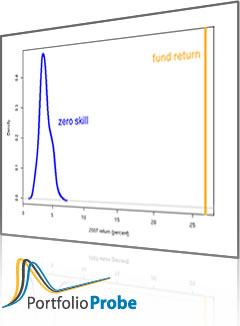Follow us using:
Newsletter Sign-up
Category Archives: Blog
Slouching towards simulating investment skill
When investment skill is simulated, it is often presented as if it is obvious how to do it. Maybe I’m wrong, but I don’t think it’s obvious. Previously In “Simple tests of predicted returns” we saw that prediction quality need not look like what you would find in a textbook. For example, there was a … Continue reading
garch and the distribution of returns
Using garch to learn a little about the distribution of returns. Previously There are posts on garch — in particular: A practical introduction to garch modeling The components garch model in the rugarch package garch and long tails There has also been discussion of the distribution of returns, including a satire called “The distribution of … Continue reading
Stock-picking opportunity and the ratio of variabilities
How good is the current opportunity to pick stocks relative to the past? Idea The more stocks act differently from each other relative to how volatile they are, the more opportunity there is to benefit by selecting stocks. This post looks at a particular way of investigating that idea. Data Daily (log) returns of 442 … Continue reading
Posted in Quant finance, R language
Tagged opportunity ratio, S&P 500, stock-picking opportunity, volatility
6 Comments
Expected returns of an investment mandate
What to expect from fund managers who follow your investment mandate. You hope that the fund managers that you hire have skill. But markets are noisy so it is hard to tell skill from luck. It is impossible to tell skill from luck if you don’t know what luck looks like. Here we draw pictures … Continue reading
Alternative equity indices and random portfolios
A study has come out of Cass Business School that investigates a number of ways of building equity indices. Andrew Clare, Nicholas Motson and Stephen Thomas, of course, include market capitalization weighting. A number of schemes that fall under the name of “smart beta” are also included. They compare the indices not only among themselves … Continue reading
A pictorial history of US large cap correlation
How has the distribution of correlations changed over the last several years? Previously Posts about correlation boxplots explained Data Daily returns of 443 large cap US stocks from 2004 through 2012 were used. The sample correlations — almost 98,000 of them — during each year were created. If we were actually using the correlations, then … Continue reading
Variability of garch predictions
How variable are garch predictions? Previously There have been several posts on garch, in particular: A practical introduction to garch modeling The components garch model in the rugarch package Both of these posts speak about the two common prediction targets: prediction (of volatility) at the individual times (usually days) term structure prediction — the average … Continue reading
Upcoming events
Highlighted LondonR is soon — see the “Previously Announced” section. New Events Thirsty Quants 2013 March 21, London. Some thirsty quants will be going for a drink on the 21st of March as of 18.30 at the Lamb Tavern in Leadenhall Market. http://www.lambtavernleadenhall.com/ Rethinking the Economics of Pensions 2013 March 21 & 22 in London. … Continue reading
Posted in Events, R language
Leave a comment
Predicted correlations and portfolio optimization
What effect do predicted correlations have when optimizing trades? Background A concern about optimization that is not one of “The top 7 portfolio optimization problems” is that correlations spike during a crisis which is when you most want optimization to work. This post looks at a small piece of that question. It wonders if increasing predicted … Continue reading
Portfolio tests of predicted returns
Exploring the quality of predictions using random portfolios and optimization. Previously “Simple tests of predicted returns” showed a few ways to look at expected returns at the asset level. Here we move to the portfolio level. The previous post focused on correlation. Win Vector Blog points out that gauging prediction quality using correlation can be … Continue reading
Posted in Quant finance, R language, Random portfolios
Tagged alpha generation, MACD, S&P 500
2 Comments
